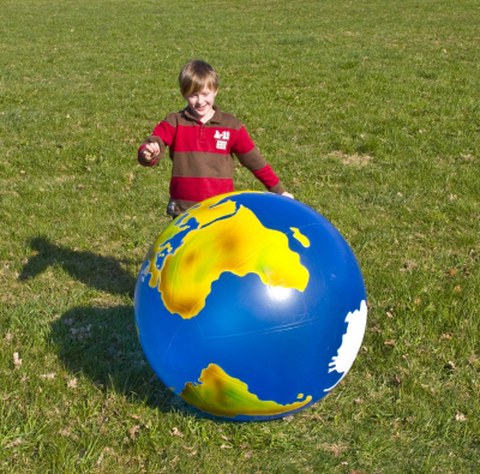Social Studies and Science Education at the TU Dresden - Profile

Der Sachunterricht unterstützt die Kinder, ihr Leben und die Welt zu erschließen.
Sachunterricht (english: Social Studies and Science Education) is a core subject in elementary school and aims to create opportunities for children to independently construct knowledge, insights and understanding of the world around them and thus develop the necessary skills for their present and future lives. In practical discussions, they learn various methods for exploring the world and apply these independently. The aim of subject teaching is to make a central contribution to basic education.
One characteristic of subject teaching is the multi-perspective view of learning objects - the "things" of subject teaching -, phenomena and situations in the world. The aim is for children to actively participate in the world around them, to help shape it by acting responsibly and making justifiable decisions. At the same time, science lessons prepare children for subject-specific learning in the natural and social science subjects at secondary level.
In contrast to other subjects at elementary school, Sachunterricht does not only have one reference science. It draws its scientific foundations from the natural and technical sciences (biology, chemistry, physics, technology) as well as from the social sciences (history, geography, politics, economics).
University affiliation of the subject
The subject area of Sachunterricht is part of primary school education in the Faculty of Education. Prof. Dr. Martina Knörzer has held the Chair since April 2014. The university education takes place as part of the degree program "Teacher Training - Elementary Schools" leading to the first state examination and is compulsory for all students of primary school teaching (8 semesters). In subject teaching, academic papers can be written for the first state examination. The degree course in subject teaching can culminate in an oral first state examination.
In our diverse range of courses, students get to know the entire spectrum of subject teaching and its didactics and can focus on their own areas of interest. We attach great importance to a practice-oriented and methodically and didactically innovative course design. In the study regulations for the degree program Teacher Training - Elementary Schools dated 20.06.2023, the following modules are defined for Sachunterricht (20 SWS in total):
Tasks in the degree program "Teacher Training - Elementary Schools"
The study area of primary school didactics is structured as follows:
In module SU-1 "Fundamentals and Concepts of Sachunterricht", students acquire basic orientations in the learning area of Sachunterricht as a component of teaching in elementary school as well as the fundamentals of the didactics of Sachunterricht (lecture, seminar and tutorial). In addition, the focus is on the subject of the child and its learning prerequisites.
In the subsequent module SU-2 "Child and the World: Dimensions and Perspectives of Sachunterricht", they deal with the dimensions and perspectives of subject teaching (educational science, scientific-technical perspectives and social and cultural science perspectives). The tutorials accompanying the lectures include excursions.
In the third module SU-3 "Natural and social science learning areas of subject teaching", the focus is on methodological design options for sustainable teaching in addition to the examination of the diverse learning areas of Sachunterricht.
The aim of the module SU-4 "Interdisciplinary aspects of Sachunterricht - education for sustainable development" is the in-depth project-oriented examination of an advanced subject in subject teaching. Students can choose their own focus with regard to interdisciplinary topics and fields of study (e.g. education for sustainable development, political education, democratic learning, contemporary history, global learning, health education, mobility education, forest education, sex education, media education and ethical and philosophical issues).
Image-Video der Professur für Grundschulpädagogik/Sachunterricht der Fakultät Erziehungswissenschaften der Technischen Universität Dresden. Ein Film von Maria Zurell und Ines Röhrborn.
Specifics in Dresden
The staff of the Chair are uncomplicated, curious and humorous teachers and researchers who offer students a multifaceted and practice-oriented university education based on the current state of research. To develop child-oriented subject teaching, excursions, school internships and projects are carried out in addition to the specialist training and sufficient space is provided for self-reflection. The department also cooperates with TU Dresden Chair ofDidactics of Civic Education and Transportation Psychology, extracurricular places of learning and various institutions and associations (including the Dresden School Museum, Dresden Transport Museum, Tharandt Forest Botanical Garden, Dresden Botanical Garden and the Deutsches Hygiene-Museum Dresden).
Elementary school learning and research workshop
The Department of Sachunterricht is closely involved in the two university learning workshops Lern- und Forschungswerkstatt Grundschule (LuFo) and Zukunftswerkstatt Nachhaltige Bildung (ZuNaBi) at Weberplatz. We are active in the Primary School Working Group at the Center for Teacher Education and Educational Research (ZLSB) at TU Dresden.
Core research areas and projects
Our core research areas and projects are just as colorful and diverse as the courses we offer. The Chair's special core research areas include
- Education for sustainable development (ESD)
- Early childhood education
- Teaching-learning research (including research-based learning)
- Nature education
- Civic education
Current and completed projects of the Chair are
We regularly take part in academic conferences and symposia and publish our research findings in relevant specialist books and journals.
In March 2018, the Chair hosted the 27th annual conference of the Gesellschaft für Didaktik des Sachunterrichts (GDSU) at TU Dresden (conference homepage: www.gdsu2018.de, conference proceedings: https: //www.klinkhardt.de/verlagsprogramm/2292.html).
